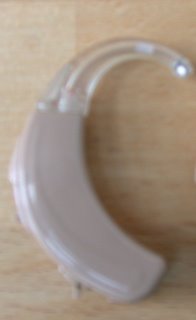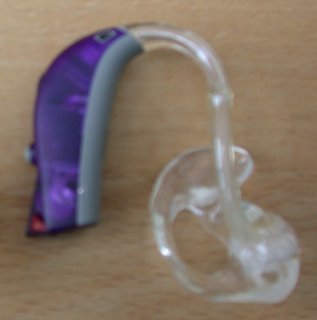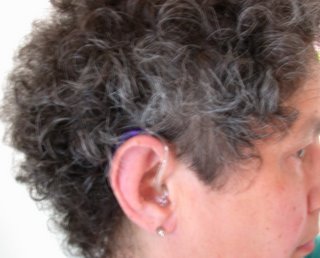And finally ... purple sound!
I have had some hearing loss since childhood, but it was only in the early 90's when my "good" ear developed tinnitus, followed by hearing loss that much was done about it.
Living in Cambridge, I was monitored at Addenbrooke's annually.
Working in a quiet environment helped a lot, but I got more and more frustrated at not hearing properly.
After all, I go to talks, lectures etc. to learn something new, not just to hear a few words and get frustrated.
I had long given up on understanding anything approaching comedy, as when the punchline is reached, it is rushed, often in a quieter voice, and then drowned out with howls of laughter. When others are asked to interpret, they might mutter something, but are more likely to say "it doesn't matter", when it does.
Anyone with hearing loss will most likely have been fobbed off so many times, that they start to doubt their sanity.
If, as in my case all you hear first is the constant high pitched hiss of tinnitus, it is harder not to think such things.
It is much worse when you ocasionally get called "cloth ears" or other names too.
Hearing loss isn't a matter of choice.
Most of you weill have experienced difficulty hearing in a crowded pub. Try imagining life being like that most of the time.
You spend so much time processing the bits of sound that almost make sense, that you are left way behind the rest of the conversation. It is frequently as though everything you hear is spoken in Russian (here insert any unknown language that might have odd comprehensible words or sounds), especially if the speaker's voice is unknown to you. You learn to understand what might have been said much better if you know the sound of the voice, and speech patterns.
So, in 1995 not long after I moved to the East Midlands, I found myself in Nottingham being fitted with a hearing aid for my left, "good", ear. This helped to get me past the tinnitus to the real sound. I was lucky, and got to attend a weekly class with a hearing therapist to learn coping strategies. After the course of classes had finished, five of us set up a support group for others with acquired deafness. Sadly this folded in 2004, by which time only two of us remained local to Nottingham, and we hadn't recruited enough new members.
When I was about 13, I had apparently lost most of my hearing in my right ear. I had an operation when I was 15, and regained some, but didn't make connections with it. Having asked if there was a chance that I could learn to use the right ear too, I underwent some more testing. This included a MRI scan. I had a hearing aid dispensed for my right ear in 1997. This made me much more balanced, and finally almost three dimensional. Prior to getting my aids all the sound I made sense of seemed to come from a small area in front of me.
By early 2001, I had outgrown my original analogue aids, and got put on the list for reassessment. In May 2002, I received my digital aids. But they were still a mucky so-called "flesh" colour. They had many advantages, such as having two microphones front and rear.
Perhaps the best one for me was that they no longer picked up interference from mobile phones and shop doorway alarm systems. They were programmed to damp down when sounds were too loud. I could only swith them on and off, and switch off the rear microphones. This was heavenly in comparison to the analogue aids.



Living in Cambridge, I was monitored at Addenbrooke's annually.
Working in a quiet environment helped a lot, but I got more and more frustrated at not hearing properly.
After all, I go to talks, lectures etc. to learn something new, not just to hear a few words and get frustrated.
I had long given up on understanding anything approaching comedy, as when the punchline is reached, it is rushed, often in a quieter voice, and then drowned out with howls of laughter. When others are asked to interpret, they might mutter something, but are more likely to say "it doesn't matter", when it does.
Anyone with hearing loss will most likely have been fobbed off so many times, that they start to doubt their sanity.
If, as in my case all you hear first is the constant high pitched hiss of tinnitus, it is harder not to think such things.
It is much worse when you ocasionally get called "cloth ears" or other names too.
Hearing loss isn't a matter of choice.
Most of you weill have experienced difficulty hearing in a crowded pub. Try imagining life being like that most of the time.
You spend so much time processing the bits of sound that almost make sense, that you are left way behind the rest of the conversation. It is frequently as though everything you hear is spoken in Russian (here insert any unknown language that might have odd comprehensible words or sounds), especially if the speaker's voice is unknown to you. You learn to understand what might have been said much better if you know the sound of the voice, and speech patterns.
So, in 1995 not long after I moved to the East Midlands, I found myself in Nottingham being fitted with a hearing aid for my left, "good", ear. This helped to get me past the tinnitus to the real sound. I was lucky, and got to attend a weekly class with a hearing therapist to learn coping strategies. After the course of classes had finished, five of us set up a support group for others with acquired deafness. Sadly this folded in 2004, by which time only two of us remained local to Nottingham, and we hadn't recruited enough new members.
When I was about 13, I had apparently lost most of my hearing in my right ear. I had an operation when I was 15, and regained some, but didn't make connections with it. Having asked if there was a chance that I could learn to use the right ear too, I underwent some more testing. This included a MRI scan. I had a hearing aid dispensed for my right ear in 1997. This made me much more balanced, and finally almost three dimensional. Prior to getting my aids all the sound I made sense of seemed to come from a small area in front of me.
By early 2001, I had outgrown my original analogue aids, and got put on the list for reassessment. In May 2002, I received my digital aids. But they were still a mucky so-called "flesh" colour. They had many advantages, such as having two microphones front and rear.
Perhaps the best one for me was that they no longer picked up interference from mobile phones and shop doorway alarm systems. They were programmed to damp down when sounds were too loud. I could only swith them on and off, and switch off the rear microphones. This was heavenly in comparison to the analogue aids.

By last summer(2005), I was convinced that my hearing wasn't as good as it could be.
I went to get a new mould for my right ear, in the hopes that might help me hear more.
At this point I was put on the list for reassessment.
(The onus is on the person with hearing loss to gauge when they are having problems, and to report it back to the clinic).
At my appointment I asked what colours were available, and was shown a set of dummy aids in about 15 shades, many of them bright. After a little thought I plumped for the purple. Does this surprise anyone? And as you can see, the purple is just my type of purple!

This aid is the Spirit III, that the NHS is now dispensing to the majority of people. If, like me, you ask, you will probably find that it can come in a colour you like, not just the all-purpose "flesh" shade. What is more, the sound is better!
The only probelm I have found so far is with switching it on and off. The battery compartment is closed to switch it on. This means that I can't switch them off when cycling and a fire engine comes rushing up behind me with its siren on. However, the quality of sound means that this isn't as deafening as with the earlier digital or analogue aids.
I just wish that they showed up better, as they are such a great colour. I'll just have to wait for my hair to go white, which might take a long time!


3 Comments:
If you've got them, flaunt them! Great colour.
When your hair does go white, you can have matching purple streaks in it, too. that would look very cool.
Didn't you know that has been my ambition for ages? Long before I heard the Jenny Josephs poem, I knew that if I ever dye my hair it will be purple. My hair just isn't turning white fast enough yet!
M,this is so wonderful, your post made my day. And thank you so much for sharing what it's been like for you. No matter how compassionate one wishes to be, it is difficult to know what it's like being in the shoes of another.
Post a Comment
Subscribe to Post Comments [Atom]
<< Home